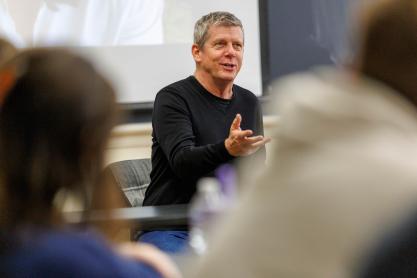In a hyperpartisan political climate, it can be hard to engage with people who hold opposing viewpoints. As Thanksgiving arrives, some University of Virginia students are approaching this year’s holiday gatherings differently. Instead of dreading difficult conversations, they’ve been preparing for them.
The Karsh Institute of Democracy’s Civic Cornerstone Fellowship, which brings together nearly 400 undergraduate and graduate students from across disciplines, was designed to address this type of challenge. And with the holiday providing a real-world test, student fellows are sharing what they’ve learned about navigating disagreement with grace.
Here are five tips from students who have spent the semester training in civil dialogue.
1. Approach disagreement with curiosity

For Frankely Ramirez, a second-year commerce student, the first step to better conversations is reframing how we think about disagreements.
“If you begin to find yourself disagreeing with your family members or loved ones, don’t view tension as something negative,” Ramirez said. “Instead, use it as an opportunity for self-growth and patience.”
Rather than seeing differing viewpoints as threats to holiday harmony, Ramirez has learned to approach them as chances to better understand the people he cares about. The key, he says, is approaching the conversation with curiosity.
“During these times, all you really need to do is listen and understand where they are coming from,” he said.
2. Focus on connection

Anna Douglas Piper, a third-year student majoring in foreign affairs and in public policy and leadership, has learned the goal of difficult conversations should not be winning arguments; it should be about preserving relationships.
“When I approach tough conversations like this in general, I try to focus on connecting with the person who is sharing their opinion,” Piper said. “I have found that it’s very hard to hate someone or seriously dislike them if you know them, which can be especially important when talking to friends or family.”
Piper acknowledges deeper moral disagreements require more than surface-level niceties. In those moments, she recommends leaning into curiosity rather than defense.
“I recommend using curiosity and asking questions in an effort to understand their opinion better,” she said. “Your time may be better spent learning from each other and not trying to ‘win’ the conversation. This can definitely be easier said than done, though.”
3. Monitor your emotions

Second-year biomedical engineering student Zoe Bastardi emphasizes the importance of self-awareness during heated exchanges, like recognizing when a conversation is becoming unproductive before it spirals out of control.
“Observe your emotions throughout the conversation if you choose to engage in debate,” she said. “Are you shutting down, or are arguments starting to be fueled by anger? Maybe it’s time to pause and recenter.”
This kind of emotional check-in requires honest self-assessment in the moment. Bastardi said it’s about recognizing your limits and respecting them.
4. Know when to pause – and how to return

Geanette Boggs, a first-year nursing student, offers perhaps the most practical advice: paying attention to the moment when a conversation shifts from constructive to counterproductive. “Be comfortable walking away and saying that you do not want to continue this conversation,” she said.
But for Boggs, stepping away is not the end goal — it’s a tool for emotional regulation. She emphasizes that taking a pause doesn’t end the relationship or even the discussion. Instead, it helps prevent conversations from becoming unproductive or harmful.
“In my opinion, it’s appropriate to end a conversation whenever you feel like it has shifted from being productive to simply an argument, or if there is no end in sight,” Boggs said.
Knowing when to pause is only half the equation. Equally important is deciding when and how to return to the conversation once emotions have settled. A simple acknowledgment that the discussion wasn’t working, paired with a genuine expression of care and an invitation to revisit the topic later, can protect your well-being while keeping the relationship strong.
5. Let go of changing minds

Jaden Kline, a third-year systems engineering and American politics student, emphasizes the importance of managing expectations when entering difficult conversations.
“It is important to accept that you cannot change the perspective of someone who is not ready or simply does not want to change it,” Kline said. ‘It can be tempting to feel like their refusal to shift is a reflection of your failure, or a sign that you are not being heard, but often it has nothing to do with you at all.”
Kline notes that some people need time, life experience or emotional safety before they reconsider their views. Trying to force a breakthrough usually creates defensiveness rather than connection.
“If you release the expectation of changing someone’s mind, you will find it easier to stay grounded and present,” he said.








